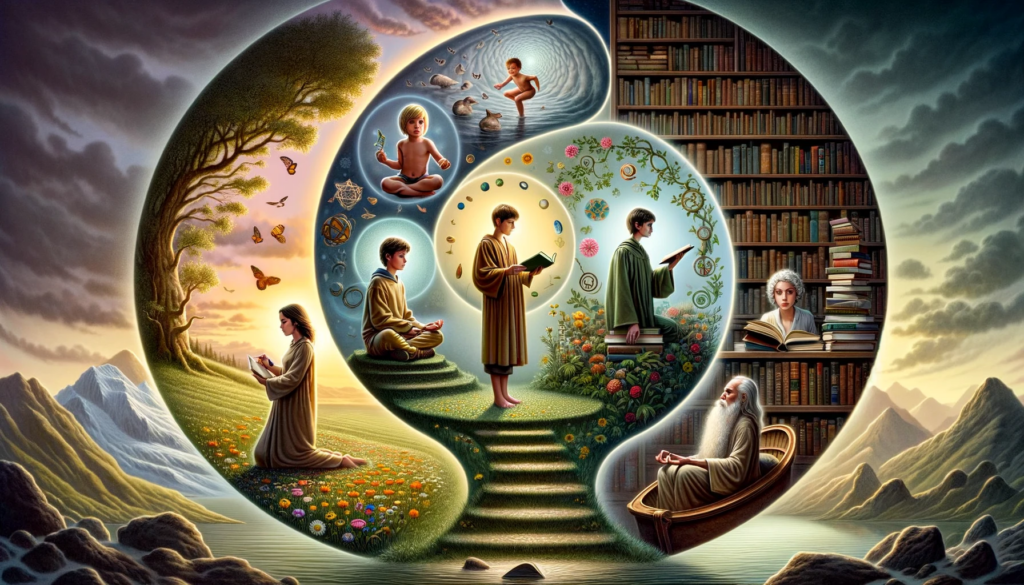
Despite different religions’ diverse beliefs and practices, the quest for knowledge and understanding is a common thread that binds them. The desire and ability to learn are two main attributes defining humanity. We have become the dominant species due to our capacity to learn about the world and pass on that knowledge to future generations. Each generation builds on the knowledge cumulatively acquired by the previous generations. What we know as hunter-gatherers versus what we know now is nothing less than miraculous when we consider that all this knowledge is simply the work of our 3-pound brains.
On the individual level, we spend our entire lives learning. As young children, we learn languages seamlessly and intuitively. Then we learn to read, and a new world of learning possibilities opens up. We know other skills, like playing an instrument or a sport, and as we grow older, we learn new skills at school and in our careers. And all the while, we are being taught by those who came before us, who have a lifetime of wisdom to share.
Religious knowledge is no exception. Knowledge of the Divine has been handed down from generation to generation since the days of the founding prophets.
For instance, in Christianity, the Bible is a source of divine knowledge, providing moral guidance and insight into the human condition. Similarly, in Islam, the Quran is revered as the ultimate source of knowledge, encouraging believers to seek understanding and wisdom. Hinduism and Buddhism also emphasize the importance of learning, with texts like the Vedas and the Tripitaka offering spiritual and philosophical guidance. These sacred texts serve as repositories of religious knowledge and encourage followers to engage in lifelong learning and self-improvement.
Religious learning often involves studying, interpreting, and internalizing these scriptures, fostering a connection to the religion’s core tenets. Many religions also have designated figures to guide students on their spiritual journeys. Through their experiences and interpretations of the scriptures, these teachers equip learners with the knowledge and practices necessary to live a faithful life.
Finally, a core aspect of religious learning is emphasizing ethical conduct. Most religions champion values like compassion, honesty, and service to others. Learning often involves integrating these values into daily life, fostering a sense of purpose and connection to something larger than oneself.
Despite their outward differences, religions share a surprisingly unified approach to learning. Through sacred texts, teachers, rituals, and a focus on ethics, religions across the globe strive to cultivate a deeper understanding of the world and one’s place within it.
Christianity
“If any of you lacks wisdom, you should ask God, who gives generously to all without finding fault, and it will be given to you.”
–The New Testament (James 1:5), Christian scripture
Islam
“Beware of confining yourself to a particular belief and denying all else, for much good would elude you – indeed, the knowledge of reality would elude you. Be in yourself a matter for all forms of belief, for God is too vast and tremendous to be restricted to one belief rather than another.”
–Ibn Arabi, Islamic scholar and poet
Taoism
“Learning also requires the right attitude. Whether we are learning the arts or sciences or mastering a physical or mental skill, we need to dissolve the barrier between ourselves and what is learned.”
–Lieh-tzu, Taoist text
Confucianism
“We tend to ‘learn’ some things but ‘study’ others. For instance, a child learns to walk but an entomologist studies the behavior of ants. We learn something practical; we study something theoretical. In learning the focus is on the learner; in studying the focus is on the subject. In learning something new, a man improves himself.”
—The Analects, Confucian text
Judaism
“Who is wise? He who learns from everyone.”
–Ben Zoma, ancient Torah scholar
Hinduism
“The immature think that knowledge and action are different, but the wise see them as the same. The person who is established in one path will attain the rewards of both. The goal of knowledge and the goal of service are the same; those who fail to see this are blind.”
—The Bhagavad Gita, Hindu scripture
Baha’i
“The education and training of children is among the most meritorious acts of humankind and draweth down the grace and favour of the All-Merciful, for education is the indispensable foundation of all human excellence and alloweth man to work his way to the heights of abiding glory.”
–‘Abdu’l-Bahá, Baha’i leader
Buddhism
“Without veering toward either of these extremes, the Tathāgata has awakened to the middle way, which gives rise to vision, which gives rise to knowledge, and leads to peace, to direct knowledge, to enlightenment, to Nibbāna.”
—In the Buddha’s Words, collection of Buddhist texts
Psychology
“Among all creatures man is characterized by a long biological childhood, and civilization tends to make psychological childhood even longer, because man must have time to learn how to learn.”
—Erik H. Erikson, developmental psychologist


